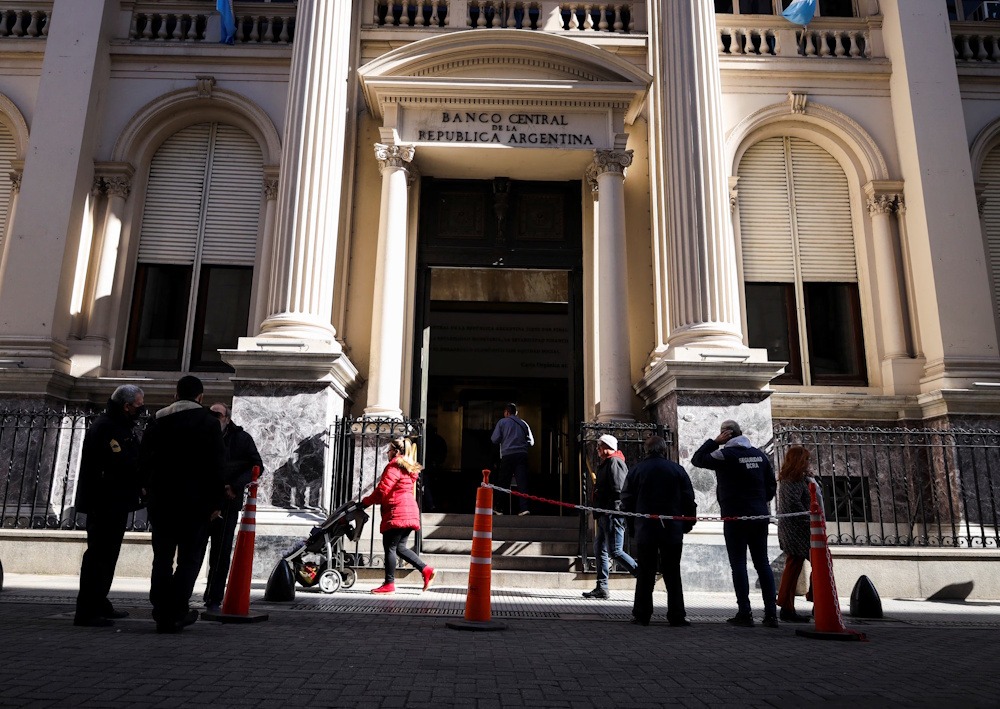Turbulence in the Argentine markets persisted on Thursday, with the Central Bank intervening by selling US$379 million to stabilize the wholesale exchange rate at AR$1,474.5. Bonds and shares experienced declines exceeding 10%, whereas the parallel rates surged significantly. On Wednesday, the monetary authority was compelled to expend US$53 million to support the peso following the dollar’s initial breach of the currency band’s upper limit. It marked the second intervention in the exchange rate since April 11, when the economy switched to a banded exchange rate mechanism from a crawling peg.
Milei is experiencing his most challenging period since assuming office. In the past month, the government has encountered allegations of corruption, experienced a setback in Congress, and suffered a defeat in the electoral arena. This week’s market volatility follows a series of legislative setbacks, with the lower house voting to overturn two presidential vetoes and the Senate rejecting another. The economic team of the Milei administration revealed the adjustment to the exchange rate simultaneously with the formalization of a US$20 billion loan agreement with the International Monetary Fund. In this new scheme, the U.S. dollar “floats” between two values, while the Central Bank is permitted to buy or sell dollars solely to maintain the exchange rate within the established lower or upper band. “Intervention criteria changed,” noted economist and investor Christian Buteler, intervention was initiated once the band was exceeded. The current band limit is subject to rounding down, and intervention takes place within the established band.
On Thursday, the upper limit of the band was AR$1,474.8. However, due to the alteration in criteria, the government commenced selling as soon as the rate reached AR$1,474.50, rather than waiting for it to surpass that figure. The MEP dollar experienced a notable ascent, rising by 2.7% to AR$1,536.51. The blue-chip swap rate experienced an increase of 2.8%, currently positioned at AR$1,564.1. The informal or “blue” dollar exchange rate was observed at AR$1,510. Bonds experienced significant declines as well. All sovereign dollar-nominated bonds experienced declines, with AE38C and AE38D both decreasing by 13.3%, while AL41C saw a reduction of 12.6%. JPMorgan’s EMBI, or country risk index, which assesses the likelihood of default, surpassed 1,400 basis points. The S&P Merval index, which tracks the performance of the foremost stocks on the Buenos Aires Stock Exchange, experienced a decline of 4.9% in pesos. Argentine businesses, traded through the American Depositary Receipts, experienced significant declines, with state-owned energy giant YPF falling by 10.4%, communication company Telecom decreasing by 9.2%, and gas transporter Transportadora de Gas dropping by 8.8%, all suffering the most substantial losses.
A report indicates that the Central Bank and the Treasury are confronted with maturities totaling US$34 billion from this month through December 2027, not accounting for payments to the IMF. The brief indicated that, to achieve that objective, the administration would need to acquire nearly US$1 billion in reserves each month. “Naturally, the figures will deteriorate by an amount equivalent to what the government sells in foreign currency between now and the election.” A report indicated that the administration would need to adjust its currency scheme to acquire reserves, presenting three scenarios: one involving a flexible exchange rate regime that completely discards currency bands, another featuring a fixed exchange rate regime following an initial surge, and the reintroduction of the exchange restrictions referred to as the “cepo.” Another individual who contributed to the discourse was former vice-economy minister Joaquín Cottani. On Wednesday, he disclosed that the administration’s strategy involved dollarizing the economy without acquiring international reserves. He stated that he ultimately resigned from his position because he “did not understand” how the government planned to accomplish that goal.
On Thursday, presidential spokesman Manuel Adorni expressed criticism towards the lower house for its decision to vote against Milei’s vetoes concerning the funding of public universities and pediatric hospitals the previous day. He proposed “suspending the entire budget of the legislative branch for four months” to finance the initiatives. Peronist deputy Miguel Ángel Pichetto issued a challenge, asserting that the expenditures of the Central Bank today could have provided “four months of university financing” for the government. “And the issue lies with Congress?” I would like to emphasize that it is a fundamental institution of democracy.

